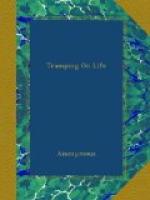She was thoroughly radical, but quiet and unostentatious about it. She looked on me and Hildreth as play-children of the feminist movement.
I think it was the exaggerated maternal instinct in her that moved her to foster and champion Hildreth and me ... an instinct that made her gather in every stray cat she found on the road ... she is the only person I have ever known who could break through the reserve of the cat’s nature, and make it as fond and sentimental as a dog is toward its master.
Mrs. Rond knew all the classics, and, in her library, which she never let go, when their economic crash came, were most of the English poets and essayists and novelists from Malory and Chaucer down to William Watson and W.L. George....
She made us welcome at her home. We formed a pleasant group together, the occupants of my little cottage back in the pines, and she, her valitudinarian husband, and her four daughters, the eldest of whom, Editha, was of an exquisite type of frail, fair beauty ... all her daughters had inherited their mother’s keen-mindedness ... she had brought them up on the best in the thought, art, and literature of the world....
The relationship between mother and daughters was one more of delightful, understanding comradeship than anything else ... in spite of the fact of Mrs. Rond’s over-developed maternal instincts ... a favourite trick of the two youngest daughters being to hide away upstairs and then call out in mock tones of agony, in order to enjoy the sight of their mother, running breathless, up from the kitchen or in from the yard, and up the stairs, pale with premonition of some accident or ill, and crying, “what’s the matter? children, what’s the matter?”
“Oh, nothing, mother ... we’re only playing.”
And her relief would be so great that she would forget to scold them for their childlike, unthinking cruelty.
* * * * *
Just before I had left Kansas to come East on my projected trip to Europe, the magazines had begun to buy my poems, the best of them—Now every poem of mine was sent hurriedly back with an accompanying rejection slip.
Yet I was sure that I was writing better than ever before.
Simonds, of the Coming Nation, and the editor of the Kansas City Star were about the only editors who now took my work. I inferred rightly that my notoriety was what was tabooing me. I determined to run up to New York and find out for myself if this was true!
As I rode north along the flashes of sea, marsh, and town, I thought of my little flock that I had left behind for a day, with intense satisfaction and content. They were mine. Hildreth was my woman, Daniel had been my child for the space he was with us. And I held Darrie in friendly tenderness, much as the bourgeois business man holds the supernumerary women of his household, though she was by no means that, nor was she in any way dependent on me....




